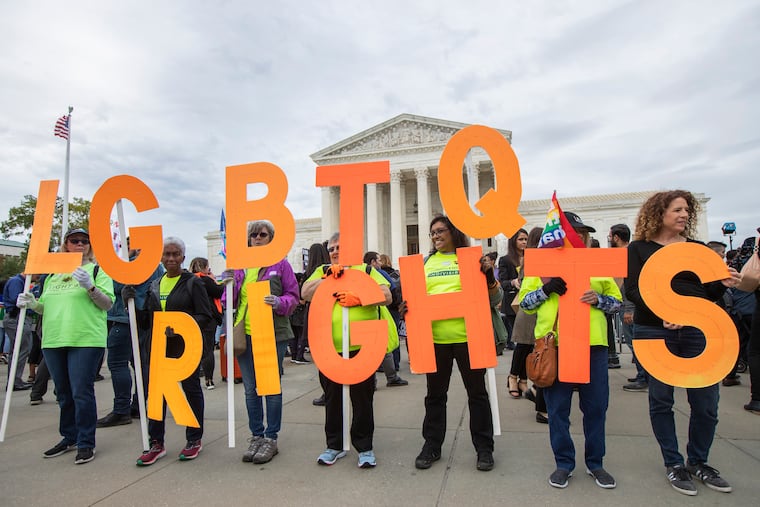Supreme Court decision a civil rights victory for LGBT employees | Editorial
Members of the LGBTQ community were elated Monday by the Supreme Court's 6-3 ruling to protect gay, lesbian, bisexual, and transgender people from employment discrimination. But advocates say the battle for full equality isn't over.

Until the Supreme Court ruled Monday that the 1964 Civil Rights Act applies to LGBT people, it was possible for employers in many states, including Pennsylvania, to argue that firing a gay, lesbian, bisexual, or transgender worker simply for being who they are was permissible. This Supreme Court ruling represents a victory not only for LGBT people but for anyone who believes in the fair treatment of all individuals — including in the workplace.
With Justice Neil M. Gorsuch writing for the 6-3 majority, the court said the landmark 1964 law’s ban on discrimination because of sex necessarily prohibits discrimination based on sexual orientation or gender identity. Gorsuch, a conservative who was President Donald Trump’s first pick to fill a vacant Supreme Court seat, was joined in the majority by Chief Justice John Roberts and the court’s four liberal justices.
The decision is being hailed by LGBT advocates and others but came as a surprise to many. Gorsuch, after all, is “everything conservatives hoped for and liberals feared,” according to a progressive law school dean the Washington Post quoted in 2019.
The Supreme Court decision was a response to three separate cases: two involved people who were fired because they were gay; the third involved a funeral home employee who was hired as a male but fired after announcing she would begin living as a woman. Two of the three litigants have since died.
A further sad backdrop is the recent murders of black transwomen in Philadelphia and Cincinnati. So far this year, 15 killings of transwomen, many of them of color, have been reported nationwide; in 2019, that number was 26.
Legal experts believe the Supreme Court decision may impact a recent Trump administration rule that eliminated Obama-era protections against discrimination for transgender people seeking medical care.
The ruling doesn’t resolve many other high-profile legal issues facing LGBT Americans. The court has been asked to rule on whether a faith-based Philadelphia foster care agency can refuse to place children with otherwise eligible same-sex couples on religious grounds. The Human Rights Campaign (HRC), the nation’s leading LGBT advocacy organization, includes rectifying what it describes as the misuse of the 1993 federal Religious Freedom Restoration Act on its list of two dozen federal legislative priorities. Other issues include protection from discrimination in housing, public accommodations, and schools, as well as prohibiting Medicaid from paying for quack “conversion therapy” for LGBT people.
Workers in LGBT-friendly states such as New Jersey, where sexual orientation has been a protected class since 1991 and gender identity since 2006, may feel less impacted by Monday’s Supreme Court ruling. But in states like Pennsylvania, which pioneered some protections in 1975 but has since lagged, LGBT people should be able to breathe a lot easier in the workplace. An unfair burden has been lifted. And a court some see as hopelessly divided along ideological lines has found a way to find a majority and move forward.
The timing of Monday’s decision — as millions continue to protest on behalf of civil rights — suggests the court may be ready to reckon with fundamental questions of justice that so many Americans clearly embrace.